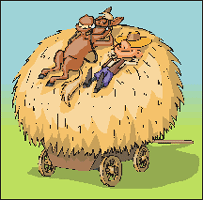As you learn more and more about English, you may feel confused when you see odd phrases that just don’t make sense. One of your friends may say, “It’s raining cats and dogs!”. When you look up at the sky, however, you can’t see any domesticated pets, only water!
These phrases are called “idioms”. Idioms are phrases (groups of words) that have a hidden meaning which isn't clear when reading the words literally. They might seem baffling or random to you, but most idioms were born hundreds of years ago, and have slowly become part of everyday English speech.
Why learn idioms? Well, if you want to become as skilled as possible in English, you’ll need to know them. Textbooks don't always teach you about them, but dropping an idiom into your conversations from time to time will help you fit in and certainly help you pass your Cambridge exams.
(If you want your English to really sparkle, buy my new online course and use phrasal verbs AND idioms!)
Here are 10 of the most common idioms that are easy to use in daily conversation:
1. “Hit the hay.”
“Sorry, guys, I have to hit the hay now!”
At first, it seems like the person saying this really wants to punch some hay. But it really just means that they’re really tired and want to go to sleep.
2. “Up in the air”
“Hey, did you ever figure out those plans?”
“No, they’re still up in the air for now. We’ll figure everything out later.”
Can plans actually be floating high in the sky? Theoretically, they could--if you wrote them down and threw them up! But this idiom really means that the situation being planned is still undecided, and that everything is still uncertain/unsure.
3. “Stabbed in the back”
“I don’t want to be Hayley’s friend anymore, she stabbed me in the back!”
Literally stabbing someone in the back could bring someone to jail! That’s definitely not what this idiom means.
Being stabbed in the back means that you’ve been betrayed by someone who you thought you could trust.
4. “Takes two to tango”
“David isn’t the only guilty one here! After all, it takes two to tango.”
It literally does take two to tango--you can’t dance the tango unless you have a partner. But this idiom means that if there’s a suspicious situation, then there’s more than one culprit. They couldn’t have done it by themselves.
5. “Kill two birds with one stone.”
“Why not go to the post office on your way to the mall and kill two birds with one stone?”
Don’t worry, we’re not actually killing any birds here! When you kill two birds with one stone, a single action knocks out two tasks or responsibilities--accomplish two different things at the same time. (In this case, posting a letter and doing some shopping in one trip.)
6. “Piece of cake”
“Ha, that assignment was really a piece of cake!”
No, the professor didn’t give them a slice of cake to eat! When something is a piece of cake, it’s so simple that it’s as easy as eating one.
7. “Costs an arm and a leg”
“Matt, I really want that car, but it costs an arm and a leg. I don’t think I should get it for now.”
When something costs an arm and a leg, you won’t literally have to cut off your arm and leg to buy it. It just means that it costs a lot of money, so it would be as painful (for your wallet) as cutting off an arm and a leg to pay for it!
8. “Break a leg”
“Hey, don’t you have a recital today? Break a leg!”
You might be scared when you hear this idiom--did they really just tell someone to break their leg?
When someone uses this idiom, they’re actually wishing the person good luck. See how confusing idioms can be? This means the total opposite of what it seems to mean!
9. “Rule of thumb”
“As a rule of thumb, you should usually pay for your date’s dinner, too.”
A rule of thumb is a “rule” that’s not totally precise. It’s based off common experience and common sense.
They aren’t based on science or research!
10. “Blow off steam”
“Hey, I’m feeling pretty angry right now. I’m going to go blow off some steam.”
To blow off some steam isn’t to stand above a tea kettle and huff and puff! When you’re feeling angry or upset, and want to do something to relieve those emotions, then you’re blowing off steam--doing something or taking a break to help get rid of the stress.















